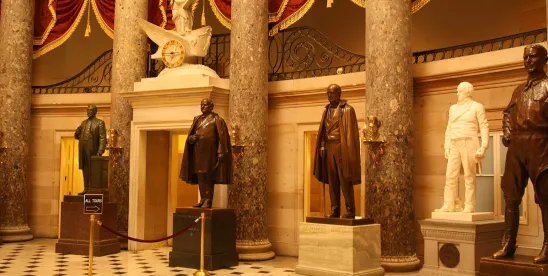Following nearly a year of committee hearings, research, policy briefs, and discussion with agency experts, the Senate Health, Education, Labor, and Pensions (HELP) Committee Chairwoman Patty Murray (D-WA) and Ranking Member Richard Burr (R-NC) introduced a discussion draft of bipartisan legislation that aims to improve preparedness and response to pandemics.
The Prepare for and Respond to Existing Viruses, Emerging New Threats, and Pandemics Act (PREVENT Pandemics Act) is draft legislation, meaning the authors continue to seek input from their colleagues, state, local, and tribal health experts and other stakeholders for proposed changes and additional recommendations. You can read the full draft text here.
Of importance and among other provisions, this draft legislation:
-
Modernizes the supply chain of critical medical products and seeks to better supply the Strategic National Stockpile (SNS). It also requires that the Secretary report to Congress on the state of the SNS, and to issue guidance and hold annual meetings with public health officials and stakeholders on how states, territories, and Tribes can access the SNS.
-
Would seek funds to provide grants to build State stockpiles.
-
Directs Biomedical Advanced Research and Development Authority (BARDA) to establish and maintain domestic manufacturing capacity for rapid production, as needed, and to ensure that manufacturing capacity is maintained.
-
-
Modernizes public health data through biosurveillance and infectious disease data collection. The draft legislation seeks to modernize existing systems of HHS and update collaboration efforts among Federal departments.
-
Fund grant opportunities to state, local, or tribal health departments, community-based organizations, Indian organizations, or other public or private entities for projects that would improve health outcomes and reduce health disparities.
-
Clarifies that existing authority for the Secretary of HHS to award grants to states to carry out regional situational awareness systems should be transferred to the CDC Director.
-
Tasks the CDC with awarding funding and contracts to entities seeking to conduct genomic sequencing for public health purposes.
-
Requires the Secretary of HHS to issue guidance for collaboration among various entities for genomic sequencing of pathogens, and to support public and private partnerships.
-
-
Provides grants to eligible entities for research and demonstration projects that support the improvement of emergency medical services and trauma care in rural areas.
-
Grants would be used for development of innovative uses of technology, establishment of trauma centers, training and education, transportation, access to prehospital care, among other opportunities.
-
-
Seeks to create more accountability for the Center for Disease Control (CDC) by requiring the Director be subject to Senate confirmation and requiring a strategic plan from the agency every four years. Currently, the position is appointed by the President, but not subject to Senate confirmation.
-
Establishes a COVID-19 Task Force to examine the origins of COVID-19 and to examine the country’s response at the Federal, state and local levels. The commission would make recommendations to the Administration and Congress, and its members would be field experts appointed by Congress.
-
Clarifies the role of the Office of the Assistant Secretary for Preparedness and Response (ASPR); also requires more regular updates from this office to the committees of jurisdiction in the House and Senate.
-
Improves access to and transparency of mental health and substance abuse services during public health emergencies by directing the Substance Abuse and Mental Health Services Administration (SAMHSA) to incorporate their activities of continued support in this area in their Biennial Strategic Report to Congress, and requiring the Government Accountability Office (GAO) to report on SAMHSA’s work during the COVID-19 pandemic, among other provisions.
-
Requires HHS, CDC, and the National Institute of Health (NIH) to work together, along with private entities, to better analyze research and forecast public health emergencies. The legislation creates a requirement for the Secretary of HHS to issue an annual report on such activities every year for the next five years.
-
Calls for the continuation of research on long-term effects of COVID-19 infection and the establishment of a multidisciplinary research program to develop medical products for priority viral pathogens with potential to cause a future pandemic.
-
Allows HHS to work with public and private entities to improve availability of diagnostic tests to address emerging infectious diseases in the public.
-
-
Improves clinical trials by requiring the Food and Drug Administration (FDA) to issue guidance on the use of digital health technologies in clinical trials; decentralized clinical trials; and other innovative designs to support development of new drugs.
-
Requires various published reports from FDA on best practices and transparency, and authorizes the FDA with expanded duties to combat drug and medical device shortages and illegal production and/or sales, among other provisions.
-
-
Seeks to expedite the development of new manufacturing approaches for novel drug development by creating a pilot program to reduce development time. The pilot program, which will wind down at the end of 2027, first requires the FDA to issue guidance on implementation and to provide regular reporting on projects.
Senators Murray and Burr expect the legislation to progress this year. Several other biomedical innovation and pandemic preparedness bills have been released, including, the “Tracking Pathogens Act,” introduced by Sens. Bill Cassidy (R-LA) and Tammy Baldwin (D-WI); Cures 2.0 (H.R. 6000), introduced by Reps. Diana DeGette (D-CO) and Fred Upton (R-MI); and the Advanced Research Project Agency – Health Act (H.R. 5585), introduced by Rep. Anna Eshoo (D-CA). The PREVENT Pandemics Act is likely to be the vehicle for these and other measures.





 />i
/>i
